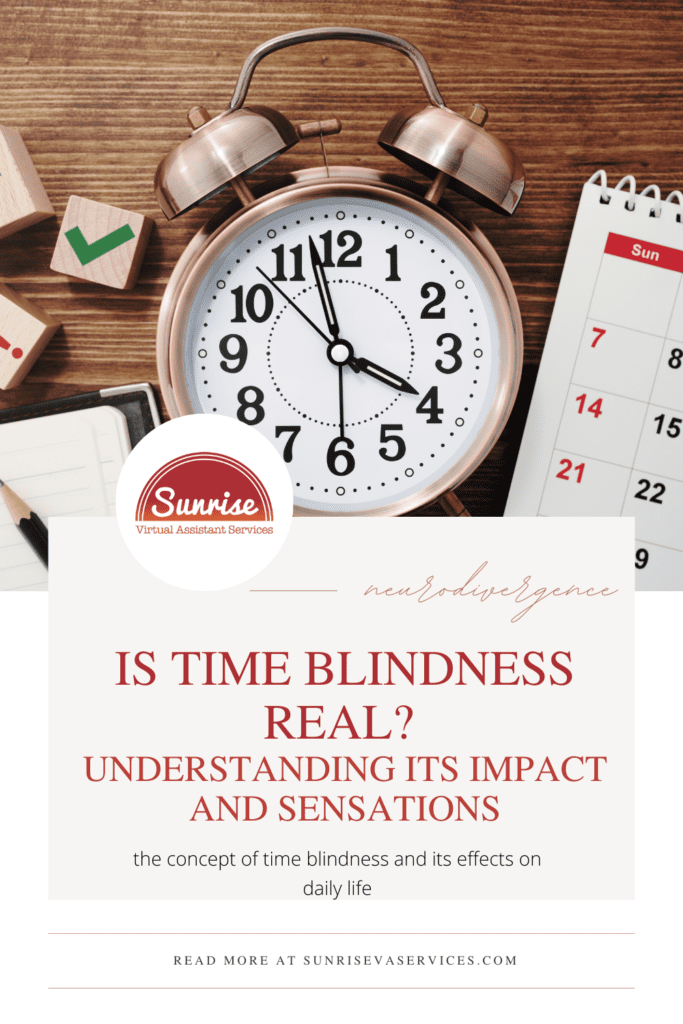Is time blindness real, or is it simply an excuse? Maybe just a metaphor for poor time management skills?
Have you ever felt like time just slips through your fingers, leaving you wondering where the hours went? You’re not alone! Many people experience this elusive sensation, often referred to as “time blindness.”
Together in this article, we’ll explore the concept of time blindness, its impact on daily life, and some strategies for managing this unique challenge. Keep reading to learn various coping strategies and reclaim your time!
Is Time Blindness Real?
Yes! Time blindness refers to the difficulty some individuals face in perceiving the passage of time, estimating time intervals, or keeping track of time.
But really, is time blindness real? For those affected, it can be a genuine struggle to gauge how much time has passed or how long a task might take, unlike the typical sense of time that most people experience. And it goes without saying too loudly that misconceptions surrounding time can lead to challenges in completing tasks, managing daily schedules, and meeting deadlines.
Time blindness is closely associated with attention deficit hyperactivity disorder (ADHD) and other neurodevelopmental disorders, like autism spectrum disorder. It often manifests as part of executive dysfunction, where the brain’s executive functions—responsible for planning, organization, and impulse control—are impaired.
Your prefrontal cortex, a part of the brain crucial for these functions, may play a significant role in these challenges.
The Science Behind Time Perception
But how does one person perceive time differently than another? The process is more complicated than you might think.
Our perception of time is a complex process involving various brain structures and cognitive mechanisms. The concept of an “internal clock” suggests that our brain can keep track of time intervals, allowing us to estimate how much time has passed or how long a future event might take.
For example, you might watch a movie and think, “we’re half-way through the third act, so this should be wrapping up soon.” That’s because your internal clock has perceived enough time for the story to play out, and you can anticipate the ending.
However, factors like sleep deprivation, sensory input, and brain differences can influence our perception of time. For individuals with ADHD, the ADHD brain may have an altered time horizon, leading to difficulties in time reproduction and estimation. These factors can result in a skewed sense of time, making it challenging to manage everyday tasks efficiently.
For example, say you need to run to the grocery store up the street. You may think it should only take 15 minutes, but be surprised when the entire trip takes 45 minutes because you spent 20 of those minutes browsing the potato chip aisle. Time can sneak up on us!
Common Symptoms of Time Blindness
Symptoms of time blindness can vary from person to person, but common signs include:
- Losing track of time during long tasks or activities
- Frequently missing deadlines or important dates
- Difficulty estimating the amount of time needed to complete specific tasks
- Trouble transitioning between different activities
- Poor time management skills, leading to impulsive behaviors
Yes, some people have used the term “time blindness” incorrectly. While time blindness is an actual condition, not an excuse, it’s important to remember that the severity of these symptoms may vary for everyone.
If you’re curious about how time blindness impacts your day to day life, you may want to check out this time blindness quiz to see how you’re affected.
The Impact of Time Blindness on Daily Life
Time blindness can have significant implications for daily life, especially for young adults trying to balance various responsibilities. Having a misconception of time can affect productivity, relationships, and your mental well-being.
Here are some areas where time blindness may have an impact for you:
Productivity and Work
For professionals, time blindness can hinder their ability to meet deadlines, manage projects, and complete tasks efficiently. Large projects may become overwhelming due to difficulties in breaking tasks into smaller, manageable steps. Truthfully, any lack of productivity can lead to stress, missed opportunities, and even career setbacks.
Personal Relationships
In personal relationships, time blindness can result in misunderstandings and frustration. Family members and friends may perceive an individual as unreliable or inattentive, leading to strained interactions. Individuals with time blindness must communicate their challenges to loved ones and seek understanding and support to avoid setbacks and pitfalls.
Daily Tasks and Routines
Everyday tasks such as planning, meal preparation, household chores, and self-care can become overwhelming for those with time blindness. Developing a routine, setting reminders, and using visual schedules or timers can help individuals stay on track and manage their daily responsibilities effectively.
It’s important once you establish a routine (which can be the biggest difficulty) that you stick to your routine. Be diligent, and adjust as needed to stay on track!
Strategies for Managing Time Blindness
You can reclaim your time, and improve you time management skills, with a few tricks of the trade.
While time blindness can be challenging, some practical approaches and strategies can help individuals improve their time management skills and regain control of their schedules:
Visual Timers and Clocks
Using visual timers and digital clocks can provide a tangible representation of time passing, helping individuals stay aware of the present moment. Placing these tools in strategic locations around the home or workspace can reinforce time awareness.
Use the Pomodoro Technique
Do you like timers? The Pomodoro Technique is an awesome time management method that involves working on specific tasks for a set period (typically 25 minutes) followed by a short break (five-minute break).
Repeating this cycle can enhance focus and productivity, making it easier to concentrate on long tasks. There are many pomodoro timers available online for free you can use.
Cognitive Behavioral Therapy (CBT)
Yes, therapies do exist to help combat time blindness. CBT is a successful therapeutic approach that can help individuals with time blindness develop better problem-solving skills and executive functioning.
You can explore strategies for improving time awareness and managing impulsive behaviors by working with a trained therapist, increasing your productivity and overall well-being.
Professional Help and Support
Connecting with others who experience time blindness can help you learn new methods and strategies for coping.
But for those experiencing significant challenges with time blindness, seeking professional help from an ADHD coach or mental health professional can be beneficial as well.
Professional experts can provide personalized guidance and support, helping individuals develop effective strategies for managing time blindness.
Apps and Technology
There really is an app for everything, and that includes time blindness. From to-do lists to reminder apps, these resources can help individuals plan their days and stay accountable for their commitments.
Want more ideas? Check out our 10 time blindness hacks for professionals.
Conclusion
Time blindness is a real phenomenon that can impact individuals with or without neurodevelopmental disorders. While it presents unique challenges, understanding its underlying causes and adopting practical strategies can help individuals regain control of their time and improve their overall quality of life.
If you or someone you know struggles with time blindness, consider exploring these strategies and seeking additional help if needed. Remember, you’re not alone in this journey, and with the right support, you can overcome the challenges of time blindness and thrive in your daily life.
By unraveling the mystery behind time blindness and learning how to better manage time perception, you can take the first step toward a more balanced and fulfilling life.


